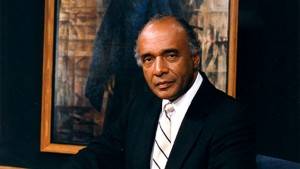The following article was published in February 1998 when I was a student at Long Island University’s Brooklyn Campus. This story appeared in Seawanhaka, the university’s student-run newspaper, where I served as senior news editor. In April 2012, veteran journalist Gil Noble died after suffering a massive stroke the previous year.

There’s no fancy theme music to introduce the broadcast. Instead, there’s the rich and pulsating beat of the African drum. No elaborate set either. The program’s serious tone is reflected by its setting – a dark backdrop whose only striking feature is an exquisite painting.
The artwork, entitled ‘Mother Courage II,’ was crafted by the late Charles White as an inspiring tribute to Black women. Seated at one end of the studio’s roundtable is Gil Noble, who as the producer and host of WABC-TV’s “Like It Is” has brought the African diaspora to the forefront in the metropolitan area for some 30 years.
Noble is no stranger to broadcast news, beginning his career as a correspondent for the New York AM radio station, WLIB, and later as a reporter for WABC-TV’s Eyewitness News. The recipient of countless Emmy Awards and a host of other accolades, Noble proved to be a resilient and dedicated reporter. In fact, it was during those heady days in the turbulent ’60s that resulted in the launch of “Like It Is” in the first place.
“’Like It Is’ was born out of the strength of our people,” Noble told me in a recent interview. “It would not exist and I would not be here had it not been for the civil rights movement.”
And for the past three decades, Noble has interviewed a broad array of figures from that seminal period, along with a range of other prominent figures, including Dr. Martin Luther King, Bob Marley, Fannie Lou Hamer, Harry Belafonte, Sarah Vaughan, The Mighty Sparrow, and Miriam Makeba.
While Noble has interviewed legends, icons, and controversial characters alike, no single individual has had more impact on his psyche than Malcolm X – a man who Noble surprisingly never got the chance to interview. “[Malcolm] told the cold, brutal facts of the Black existence in this country. He told me who I am, and I have kept that knowledge with me ever since, even as I walk down the corridors of ABC wearing a smile,” Noble wrote in his 1981 memoir “Black Is The Color of My TV Tube.”
“His speaking ability helped to clarify what was going on,” Noble told me of Malcolm X. “He was not just an orator – he helped to tell us about our story.”
In a recent edition of “Like It Is,” Rev. Wyatt Tee Walker, who worked alongside Dr. King during the civil rights struggle of the ’60s, told Noble that African-Americans have largely taken “two steps forward and three steps back” since the days of the movement.
And Noble agrees with that assessment while offering some evidence of his own. “I went to a graduation ceremony at Howard University. It took about a half-hour for all of the graduates to be seated,” he recalls. “It struck me that here were all of these brothers and sisters graduating with Ph.D.’s and master’s degrees while the overall situation involving our people remains the same.”
 While Noble readily concedes that there have been changes in the TV news landscape in recent years, he doesn’t believe that merely increasing the number of Black anchors and reporters will shatter prevailing stereotypes. “Editorial decisions in newsrooms are made by people who are not seen,” Noble says of producers. “No matter how many puppets are on stage, it is the puppeteers who determine what happens on stage.”
While Noble readily concedes that there have been changes in the TV news landscape in recent years, he doesn’t believe that merely increasing the number of Black anchors and reporters will shatter prevailing stereotypes. “Editorial decisions in newsrooms are made by people who are not seen,” Noble says of producers. “No matter how many puppets are on stage, it is the puppeteers who determine what happens on stage.”
Meanwhile, Noble continues to maintain a deep connection to the birthplace of his parents – Jamaica. “It’s an important part of the Black diaspora,” he explains. “The beauty of the island is enhanced by its people.”
Few subjects, though, capture Noble’s interest more than the current state of the nation’s youth. “The story of the ’60s was the result of young people,” he notes. “Unfortunately, many of today’s young people don’t have the same fire.” Still, he advises students of color to be prepared since “the struggle is not over – in fact, it is more treacherous because racism is harder to discern.”
From civil rights and anti-Vietnam War protests in the 1960s and early ’70s to rallies against apartheid in South Africa during the ’80s and ’90s, the nation’s college campuses have long served as a dramatic backdrop for youth-led activism over wrenching socio-political issues. Not surprisingly, Noble – who covered his share of stormy demonstrations in the civil rights era – is hoping for the day when youth are once again politically engaged and aware of the many issues impacting their communities.
But that won’t happen, he argues, until they’re equipped to do so. “I’m concerned for young African-Americans who are watching soap operas with no relevance to their own realities,” he says. “Jerry Springer has nothing to offer our people, who unfortunately are allowing books in the libraries to be stacked with cobwebs. Our best hope for tomorrow lies in the reflection in your mirror – think about it.”
The following is an interview that Mr. Noble conducted in 1980 with Bob Marley in New York City.


Add Comment